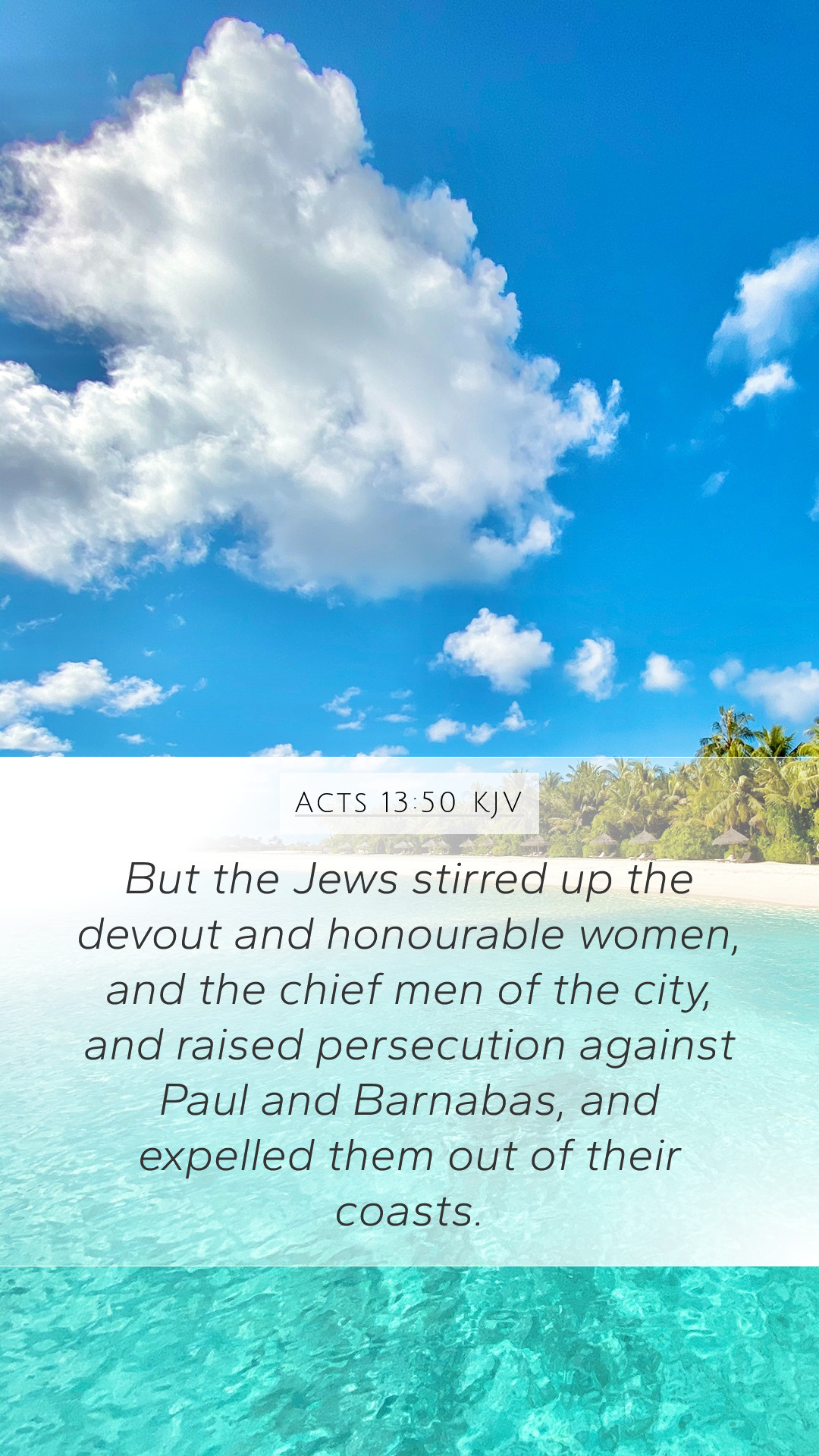Bible Verse Commentary: Acts 13:50
The scripture in Acts 13:50 reads:
"But the Jews stirred up the devout and honorable women and the chief men of the city, and raised persecution against Paul and Barnabas, and expelled them out of their coasts."
This passage conveys significant events during Paul's mission as he and Barnabas encountered both acceptance and fierce opposition. Through an analysis of this verse, we can derive insights on the nature of persecution faced by early Christians and the societal dynamics at play. Below is a detailed exploration combining insights from public domain commentaries.
Contextual Understanding
In the Book of Acts, the apostles were on a mission to spread the gospel. This specific event in Acts 13:50 illustrates a critical moment where opposition mounts against them, made evident by the actions of the Jews who incited the local populace against Paul and Barnabas.
Historical Background
The context of the verse reflects the social and religious landscape of the time. The Jewish leaders felt threatened by the new teachings of Christianity, particularly as they attracted a following. Paul and Barnabas' message challenged established norms and frightened those in power.
- Matthew Henry's Commentary: Henry discusses the motivating factors of jealousy and fear among the Jewish leaders. His insights suggest that they were distressed by the growing influence of Christianity, leading them to harass the apostles.
- Albert Barnes' Commentary: Barnes emphasizes the role of women in this society, highlighting that 'honorable women' were often influential in instigating public sentiment, thus playing a key role in the apostles' expulsion.
- Adam Clarke's Commentary: Clarke notes the strategic use of local leaders and respected community figures by the Jews to garner support against Paul and Barnabas, illustrating the manipulation of public opinion.
Key Themes
- Persecution of Believers: The hostility faced by Paul and Barnabas is indicative of a broader theme in the New Testament; believers often faced opposition due to their beliefs.
- The Role of Community Influence: This verse highlights how influential figures in a community can affect decisions and opinions, critical for understanding the dynamics of early church growth.
- Commission and Perseverance: Despite the opposition, Paul and Barnabas' commitment to their mission underlines the resolve required for spreading the gospel in hostile territories.
Biblical Exegesis and Meaning
To dissect the meaning of this passage, we must analyze key components:
- Stirred Up: The term indicates that the opposition was not inherent but rather incited, showing a calculated effort to undermine the apostles' work.
- Devout and Honorable Women: Their involvement signifies the importance of women in the early church, as well as their potential to influence socio-political outcomes.
- Expulsion: The act of expelling Paul and Barnabas reflects the extreme measures opponents took to protect their authority and combat the spread of Christianity.
Application to Daily Life
This verse has profound implications for believers today:
- Embracing Resistance: Just as Paul and Barnabas faced opposition, modern believers may encounter challenges when sharing their faith. Understanding this builds resilience.
- Community Dynamics: Recognizing the influence of community leaders means that believers should engage positively with their contexts to promote understanding and dialogue.
- Perseverance in Faith: The unwavering commitment of the apostles serves as an example of how to respond to opposition—by relying on faith and continuing to spread love and truth.
Related Scripture References
- Matthew 10:16-23: Teachings of Jesus about being wise as serpents while facing persecution.
- Acts 14:2-3: Further examples of opposition faced by Paul and Barnabas during their ministry.
- 1 Peter 4:12-14: Instructions to rejoice in the face of suffering for the sake of Christ.
Final Thoughts
Acts 13:50 is a testament to the early church's struggles and triumphs in spreading the gospel amidst societal opposition. The insights gathered from respected commentaries provide clarity on the dynamics of faith, persecution, and community influence. As modern readers, contemplating these themes reinforces our understanding of the scripture and encourages us in our faith journeys.
Utilizing the themes and insights from Acts 13:50 can enhance Bible study groups and lead to more profound discussions during online Bible study sessions. Understanding scripture, including the deeper meanings behind difficult passages, enriches personal and communal faith experiences.


